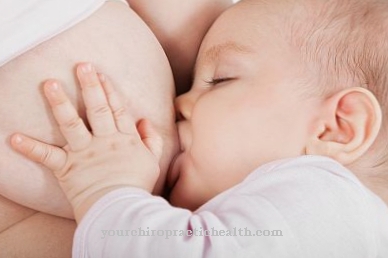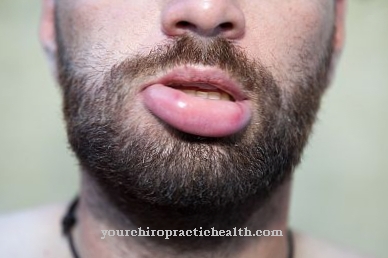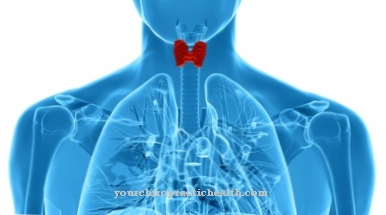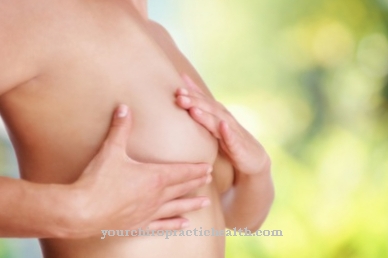Sweats and excessive sweat are secretions of the sweat glands in the skin. These sweats usually occur under the armpits, on the forehead, on the palms of the hands and feet in the genital area, chest and stomach. However, some people also sweat very often on their backs.
What are sweats?

Sweating and occasional sweats are perfectly normal. They are triggered by the skin's sweat glands, which are found all over the body. The human organism has no less than two million sweat glands, with the highest concentration in the forehead, hands and feet. The sweat itself is slightly acidic and consists mainly of water. But it also contains ammonia, urea and sodium chloride (salt).
Sweating and outbreaks of sweating are vital processes that primarily serve to regulate the temperature of the human body. When it's hot or you move around a lot, the moisture in the sweat cools you down comfortably so that the body does not overheat. But even with excitement, fear and nervousness it can lead to strong sweats. Furthermore, the sweat also protects against pathogens.
Unnatural sweating or outbreaks of sweating occur when the organism secretes more sweat than is necessary for heat regulation. However, about 3 liters of perspiration per day are still normal, which can be secreted especially at night.
causes
Sweating and profuse sweating can have a variety of causes. As is well known, non-pathological causes are vigorous physical activity (sport, work), heat, nervousness, stress, fear and excitement. Furthermore, being overweight, having a sauna and overly thick clothing can lead to profuse sweating.
During the menopause, especially in women, due to the hormonal change, sweating increases occur, which, however, disappear after a certain time.
The most well-known sweats are probably associated with fever and chills, which can usually occur with infectious diseases. But side effects of various drugs can also cause sweating. Sometimes a personal disposition is also the cause of profuse sweating.
Below is a list of illnesses where sweating can be a symptom.
You can find your medication here
➔ Drugs against sweating and sweatingDiseases with this symptom
- Hyperhidrosis
- Coronary heart disease
- leukemia
- Heart attack
- Tetanus
- Obesity
- Hormone fluctuations
- Anxiety disorder
- tuberculosis
- Mushroom poisoning
- Menopause
- Angina pectoris
- Hyperthyroidism
- Pulmonary embolism
- Appendicitis
Diagnosis & course
Short-term sweats with a known cause (such as outside temperature or nervousness) usually do not require any medical diagnosis.
However, if sweats occur over the long term, if they occur independently of recognizable triggers and / or if they are accompanied by pain, an illness may be the cause. Usually a diagnostician asks about a patient's medical history and the time of the first sweat.
Further diagnostic steps are based on the suspected diagnosis - with the help of an iodine starch test or gravimetry, for example, the extent of sweat production can be recorded.
The course of sweats without a known cause depends on the underlying disease - targeted therapy methods can alleviate the occurrence of sweats.
Complications
The outbreaks of sweats are usually what is known as psychological sweating. This is not triggered by physical, but by psychological exertion. Above all, these include stress and depression. Sweats are usually not medically bad and occur in all people in stressful situations.
However, if sweating occurs very often and is relatively strong, a doctor must be consulted. Here a psychologist can help and treat the causes of the sweating. Treatment with your own resources is usually not effective. Treatment with medication rarely takes place.
Sweating can lead to an increased feeling of shame and thus also to social exclusion. Often the people affected can no longer lead their everyday life in the usual way and can no longer go to work without difficulties. Therefore, sweating can severely limit personal life and thereby reduce the quality of life.
The sweats do not create any health complication or affect the physical properties of the body. They also mostly do not occur during sporting activities. The removal of the sweat glands is not possible from all parts of the human body, so that the outbreaks of sweat can only be limited to a limited extent.
When should you go to the doctor?
Sweating does not always have an illness value. Suddenly sweating is usually not a cause for concern. It can occur as a result of stress or as night sweats. But sweating can also point to intestinal problems, latent liver disorders or hypoglycaemia in diabetics.
Since sweats can occur in many contexts, the accompanying symptoms are interesting. If the person concerned feels shaky, weak or sick when they sweat, a doctor is advised. Most of the time, the person affected can attribute the sweating to known causes. People are going through menopause, have diabetes, or feel unwell after eating. As a self-treatment against outbreaks of sweating, Kneipp applications, sage tea as internal application, fasting days or cold washing can be tried out. Sometimes sweats can be traced back to unsuitable clothing made from synthetic fibers.
A gynecologist can provide relief for those affected when they sweat heavily during menopause. If a liver disorder is suspected, a change in diet can lead to an improvement. The person concerned treats latent liver disorders himself. A doctor should assess more serious disorders in the liver area.
Sweating caused by a sudden panic or fearful situation does not necessarily have to result in a doctor's visit. Some people have a panic attack. If someone suffers from recurring panic attacks on a permanent basis, a visit to a psychologist makes sense. Here the restrictions on the quality of life are too significant.
Doctors & therapists in your area
Treatment & Therapy
In most cases, sweating or outbreaks of sweating do not need to be treated because they are short-lived or have no pathological causes.
However, if the sweating is very strong and recurring, a doctor should be consulted. Immediate medical examination is necessary, especially if the sweats occur with pain in the chest and heart area.
Unfortunately, there are still no good ways to find out the reasons for the heavy sweating through blood tests, so that the questioning by the doctor (anamnesis) is the most important finding of the cause. The doctor will determine how long the heavy sweating has been going on and under what circumstances, how often and how much it occurs again and again.
With a starch-iodine test, the doctor can then localize the area where the sweat glands are working particularly hard. How much sweat is formed in the glands can be determined by gravimetry. On the basis of these measured values, it can then be determined whether the amount of sweat is above average, i.e. abnormal, or is in the normal range.
If the cause is then established, the appropriate treatment therapy is initiated. Further blood tests and ultrasound examinations can also be carried out for this purpose. In most cases, a good antiperspirant is enough for sweating. These can be purchased in shops and pharmacies as sprays, creams and powder products. Antiperspirants ensure that the sweat glands constrict and thus produce less sweat. However, deodorants and antiperspirants do not combat the cause, but only the effect of perspiration.
If the cause is to be treated, the underlying disease should always be treated first. Furthermore, there is also the option of soothing the sweat glands with electrical applications (direct current), even with heavy sweating, without a cause of illness. Further medical treatment options are: sweat gland suction (suction curettage), blocking of the nerves (sympathectomy), removal of the sweat glands (excision) and the injection of botulinum toxin to block the nerve tracts in the sweat glands.
Outlook & forecast
Sweats occur in many people and are usually triggered by stress or uncomfortable situations. They are therefore mainly short-term, but can severely limit a person's everyday life.
Often times, sweats are a temporary symptom. If this occurs rarely, it does not need treatment. The sweats usually go away on their own when the stressful situation is over. However, if sweating occurs more often and reduces the quality of life, a doctor must be consulted.
Treatment mainly takes place with a psychologist. The causes and reasons for the outbreaks can be analyzed there. Therapy will bring the outbreaks under control and reduce their frequency. In most cases, therapy is successful and no further complications arise.
If left untreated, sweats can sometimes lead to mental health problems and depression. The patient's everyday life is difficult and the person is tense inside.
You can find your medication here
➔ Drugs against sweating and sweatingHome remedies & herbs for sweating & sweating
- Sitz baths with oak bark have proven effective for hemorrhoids. For a full bath, boil 1 kilogram of oak bark in a few liters of water for about 15 minutes and then add the decoction to the bath water. An oak bark bath also helps with skin diseases, poorly healing wounds, sensitive skin and a tendency to sweat profusely.
- Sage and sage tea works by preventing the production of sweat in the sweat glands.
You can do that yourself
Sweating can be reduced through various measures and home remedies. Acutely, it helps to dip your hands and feet in lukewarm water or rub them with rubbing alcohol. Regular saunas strengthen the sweat glands and thus reduce sweat production in everyday life in the long term. Lukewarm showers and alternating showers have a similar effect on the skin.
Foot powder, which is applied directly between the foot and the socks, helps with foot sweat. Sweating resulting from fear and nervousness can be reduced by relaxing and treating the causes. Antiperspirants and home remedies such as a brew of horsetail and oak leaves, which are applied directly to the heavily sweating areas, help with severe symptoms. Applications with tomato juice or fenugreek soothe the overactive glands and thereby reduce perspiration.
In addition, the following applies: Wear clothing that allows air to circulate between the skin and the fabric. Linen and breathable functional textiles, for example, have proven themselves. In the long term, sweating can also be relieved through weight loss, regular exercise and a change in diet. Alcohol and cigarette consumption encourage sweating and should be reduced, as should the consumption of spicy or salty food.
↳ More information: 10 tips against sweating
























.jpg)



